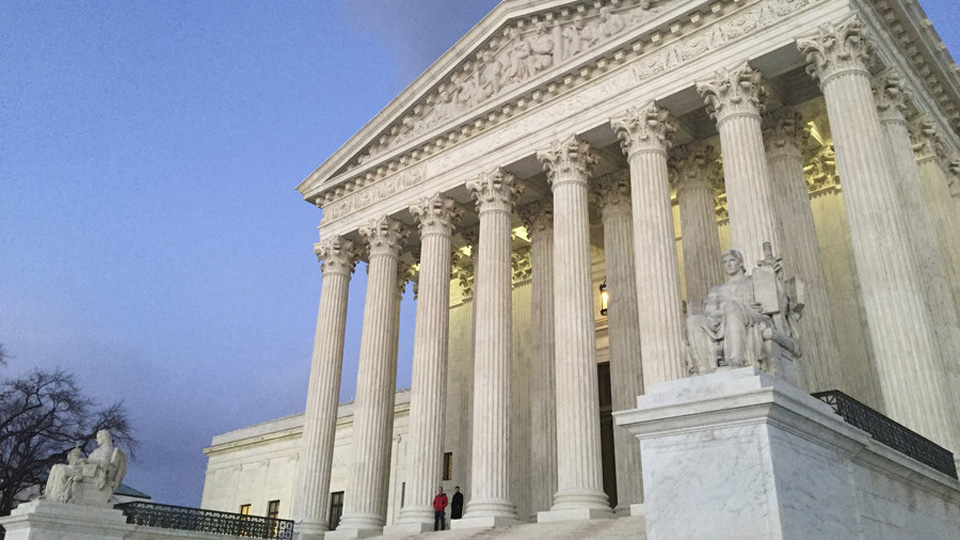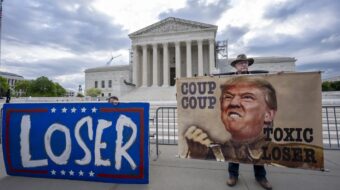
WASHINGTON—When a company forces a worker into mandatory arbitration of everything from unsafe working conditions to unpaid overtime, does that trump the worker’s rights under federal labor law? And how about a group of workers?
The Supreme Court wrestled with those issues on their opening day, October 2. Their decision will impact all workers, nationwide.
That’s because studies show, lawyer Daniel Ortiz told the court, that 55 percent of employment contracts covering non-union workers force individual workers to take disputes to arbitration and 23 percent of those pacts ban class actions, too.
That means 60 million workers who have individual disputes with their bosses have mandatory arbitration as their only avenue for complaint. And 25 million of those workers can’t even sue as classes, either, Ortiz told Chief Justice John Roberts and Justice Anthony Kennedy, the court’s “swing vote.”
The three cases involving arbitration and labor law, called the Murphy Oil case for convenience, were all rolled into one argument at the High Court. They are important to workers for two reasons.
One is workers are more likely to win class action suits – and get higher damages – than in arbitration. The other is if the court says the 1925 Federal Arbitration Act overrides the 1935 National Labor Relations Act’s protection of workers when they take “concerted action” to help themselves, labor law won’t cover individuals or worker groups, either.
The National Labor Relations Board has been tossing out mandatory arbitration clauses left and right ever since a prior Supreme Court ruling, D.R. Horton, five years ago, NLRB General Counsel Richard Griffin told the justices. He said the clauses break labor law. The Democratic-named justices agreed with him. That even applies in cases where only one worker sues, and others join to make a class later, Griffin told Justice Elena Kagan.
“The board’s law is that if an individual takes action to initiate, to induce or to prepare for group action, that is concerted activity” which labor law protects, Griffin, a former union chief counsel, explained.
“From the beginning of the National Labor Relations Act, individual agreements could not be used to require employees to proceed individually in dealing with their employers,” Griffin told Kennedy.
But lawyers for the three companies arguing for mandatory arbitration, and for the Trump administration Justice Department – which reversed course from the Obama administration and left the NLRB and the workers to fend for themselves – said the law ordering mandatory arbitration overrides virtually everything.
The only exception, they conceded, is if another federal law explicitly says it takes precedence over arbitration. And they contended the NLRA doesn’t say that.
Labor law’s protections are “directed to the workplace, not the courthouse,” said attorney Paul Clement, a former Solicitor General – the government’s top lawyer – under GOP administrations. “What it protects is their right in the workplace to decide they want to get to the courthouse, but once they get to the courthouse…” he said before Justice Ruth Bader Ginsburg cut him off.
“The courthouse is not an issue here, as I understand it,” said Ginsburg, who kept emphasizing the practical impact of imposing mandatory arbitration on workers.
“These employees say ‘We don’t object to the arbitration, but what we do object to is the one-on-one, the employee against the employer.’
“And the driving force of the NLRA was the recognition that there’s an imbalance, that there was no true liberty of contract. So that’s why they said in the NLRA (that) concerted activity is to be protected against employer interference.”
“That’s right, but it says collective action by employees in the workplace,” Clement replied. “Where does the NLRA say ‘in the workplace?’” Ginsburg asked. “It says ‘for the mutual benefit and protection, mutual related protection.’”
“Right. It doesn’t say in the workplace. I’m saying that’s where it” – labor law – “is directed in every context,” Clement replied.
That also peeved Kagan. She told Clement that taking away a right – to act together under labor law – can’t be excused just because arbitration is available as an alternative remedy for wrongdoing.
Several of the justices, including the newest, Trump-nominated Neil Gorsuch, asked no questions. Gorsuch is considered to be a reliable vote against workers and for the companies involved, given his past rulings and opinions on the federal appeals court in Denver. Several of his rulings have been very pro-arbitration and against any alternative, law professor Amy Howe wrote in Scotusblog.com.
“A divided Supreme Court seemed likely to uphold employment agreements that require an employee to resolve a dispute with an employer through individual arbitration, waiving the possibility of proceeding collectively,” Howe predicted.
Anticipating workers will lose the Murphy Oil case, four state legislatures are looking at giving workers another route to justice, Harvard law professor Melissa Greenberg reported in Harvard’s On Labor blog: Allowing workers to sue individually, as if they are private attorneys general, to enforce the law where agencies can’t or won’t. California already has that private right of action in several areas of law, Greenberg said – including employment law.












Comments